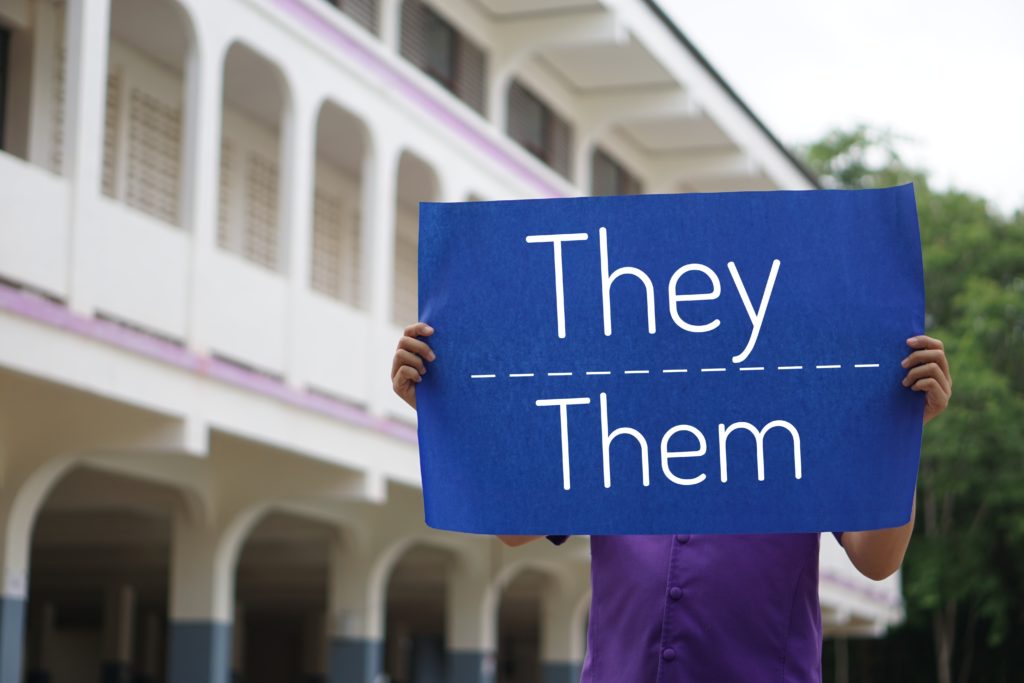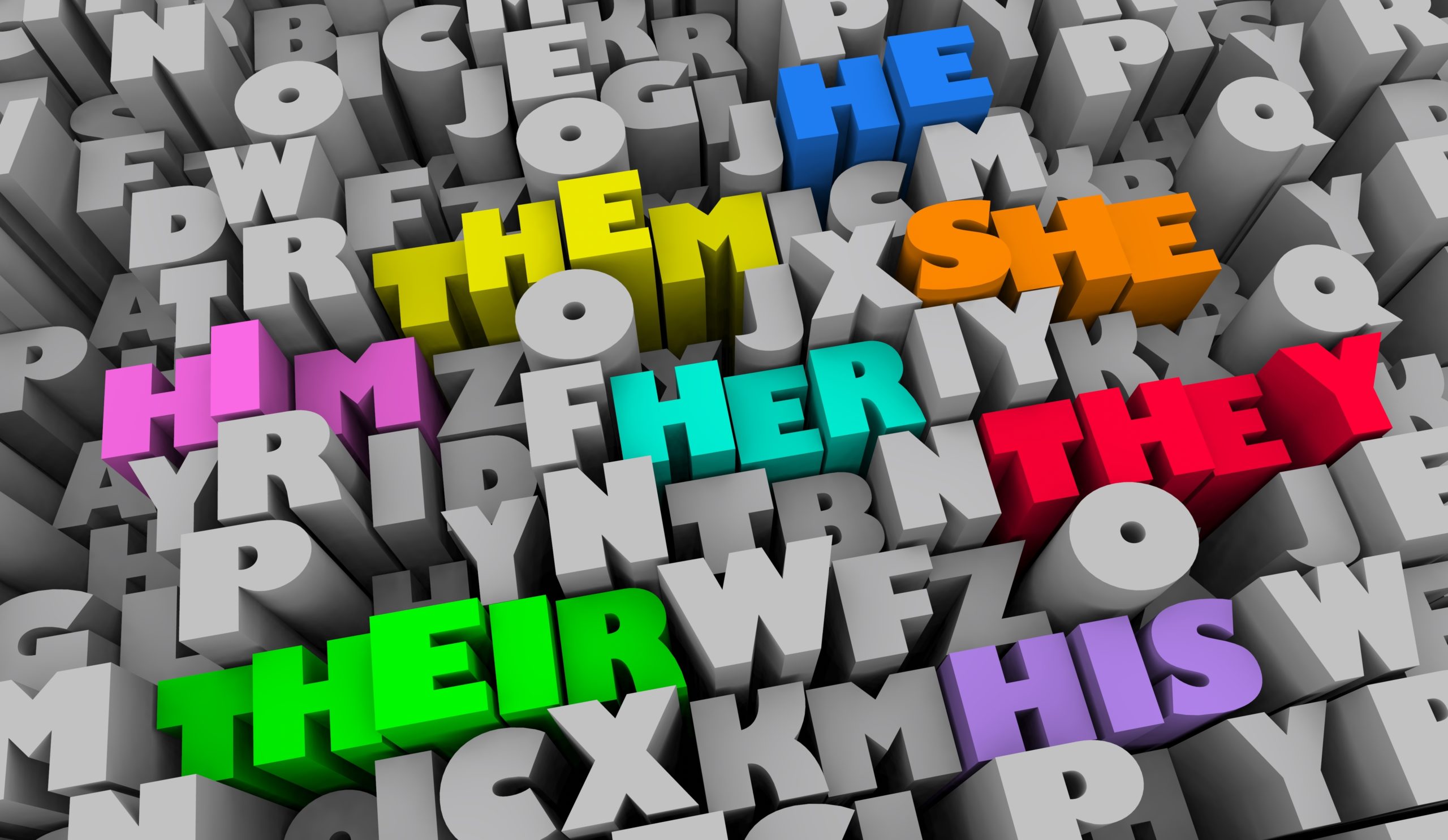CORPORATE AMERICA HATES IT, EDUCATION LOVES IT, YOU DECIDE!
If there is one thing humans like to do, it’s to categorize and label everything, including people. We find it helps us organize our reality and create a sense of stability, something we can rely on. Therefore, we have a name for every person walking this earth. We also have additional designations called “pronouns” that help us distinguish and classify ourselves and that directly relate to our sense of gender identity.
Well, with over a hundred gender pronouns currently in use that are broken up into personal, demonstrative, relative, indefinite, interrogative, possessive, and pronominal adjectives — correct, non-offending pronoun use has become incredibly complicated. Why?
For thousands of years, the world and its two gender classifications seemed so B&W and without confusion. We all appeared to want to conform to this social convention. We also deemed the two genders as a biological fact that we all were supposed to fit our identity within. Not anymore.
All of this comes down to our identity and individuality — it’s the need to be seen for who we truly are. It means being able to live comfortably within our own skin, and our own emotional being no matter where we are in the world.
Okay … so what’s the big deal?
The simple answer is that each of us is an individual with our own sense of self. Since the day we were born, we’ve been guided, consciously or unconsciously, to fit within socio-cultural norms. For most of us, we’re pretty much okay going along with that schema.

So, everyday life within our family and society isn’t much of a strain. We don’t really have to think too much about “who we are.” Instead, we deal with the usual issues of peer pressures, puberty, hormonal changes, and everything else connected with the process of maturation even into our adult life. And our pronouns of choice — he/him, she/her — are what we’re comfortable living with.
That isn’t the case for many people. First, for most of us, trying to fit in as we’re growing up is like running the gauntlet. We want so much to be part of the gang that we’ll try on all sorts of identities and personality characteristics. It’s somewhat like trying on different clothes to see which combination will gain us inclusion in whatever group we’re striving to be a part of.
Sadly, we’ll compromise our sense of self in order to fit in. We’ll subvert and suppress satisfying our inner need to express ourselves in a way that’s uniquely authentic to us. We’ll do all of that just to be accepted and included. The outcome is that we truly give way to a pseudo-personality based on external conventions whether that’s derived from family, work, school, community groups, religion, or politics. And we conform to the pronouns that fit those societal norms.
In today’s religiopolitical climate, identity is being battered. So many people are pushing for a world where everyone is the same. It’s called homogeneity. The purpose of striving for sameness is about one thing: comfortability. Oh, there will be those who rationalize that “everyone being the same makes life so much easier,” “diversity weakens our nation,” or “the Bible says ….” It’s all based on two things: fear and the need to be right.
Fear, as we all know, is the greatest obstacle in all life. It hamstrings us in ways too numerous to count and we often allow it to run the show. That’s true when it comes to dealing with people who don’t fit within our social “norms,” who don’t look, act, talk, and think like us. But if you stop and think about it, that applies to every person on the planet simply because we’re each unique.
Humans were never designed to be exactly like each other. We truly are individuals, no two of us alike. There’s a reason for that. It’s so that we discover and learn from life in a way that speaks to the most sacred part of our hearts, our Souls. To do otherwise is to subvert ourselves to another person or group’s agendas. By doing so, we lose sight of ourselves in the process.
When we do that, we are no longer living our lives but someone else’s according to their wants and needs, their particular perspectives and understandings, their values and beliefs — all of which may be formulated by their desire for power, control, fame, authority, and their insecurities, greed, shortcomings, paranoia, neuroses, and fears.
Yet, there are those who believe they know what’s best for anyone else, that their way is “the” way, the proper way, the only way, the way that’s best for the entire human race. Friedrich Nietzsche stated it best: “You have your way. I have my way. As for the right way, the correct way, and the only way, it does not exist.”
Today, so many people aren’t willing to relegate themselves to the binary system we’ve lived with for so long. They find it dismissive, devaluing, and disrespectful. Basically, dehumanizing. They no longer want to be pigeonholed into a formalized descriptive label that doesn’t fit them. Just because we’ve operated this way for thousands of years doesn’t mean it’s right. As humans evolve, we learn better ways of being and knowing ourselves.
So, the plethora of pronouns now in use can be looked at from this perspective: we’re each a unique individual and we all want to be seen, understood, accepted, and even loved for who we truly are. Of the four of these, the most important isn’t the one you’d think.

What we want more than anything is to be understood. If someone understands us, then we feel seen. If being understood and seen are in place, then it doesn’t matter so much whether we’re accepted and loved. Why? Because we’re able to then live comfortably and with confidence within our own sense of identity. Our sense of identity and well-being are no longer dependent on others.
Believe it or not, this ties in with the “woke” movement. Essentially, it’s about “waking up” to the fact there we don’t live in a binary world — as much as we’d like for that to be the case simply so we can feel comfortable with the world around us.
There’s no denying that our world is one of abundant diversity. Humans are just as diverse as anything in nature, even when it comes to our identity. So why not “wake up” to that diversity and allow each individual to shine in their own unique way, which includes being addressed by the pronouns of their choice? It may not fit within the parameters of our “reality,” but it says to the other person, “I honor you and your choice.” You are called by the pronouns that work for you and would like others to honor that, so why not vice versa?
If you feel the world only needs to be one way, then you’re doing yourself a disservice. Look at the world around you, and take note of nature and humanity’s diversity. You are part of that — enjoy it to its fullest, pronouns and all.


